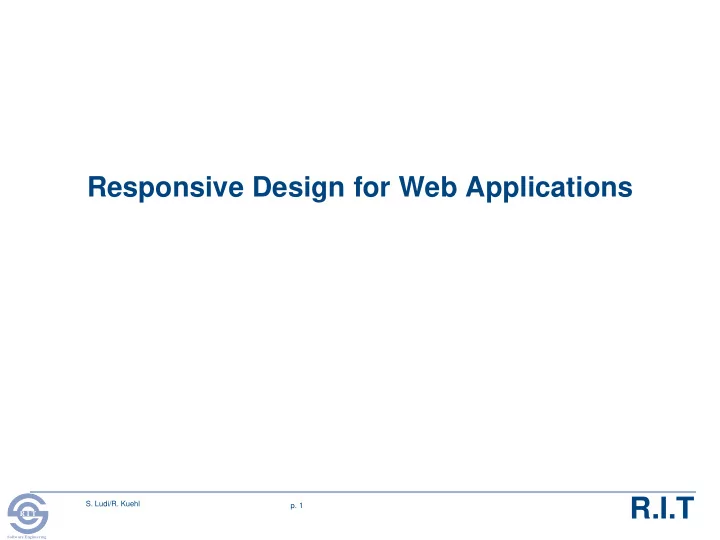

Responsive Design for Web Applications R.I.T S. Ludi/R. Kuehl p. 1 R I T Software Engineering
What is the Problem? Credit: Matt Griffin R.I.T S. Ludi/R. Kuehl p. 2 R I T Software Engineering
What is the Problem? Mobile web access is ubiquitous One interface design does not fit all screens for optimal user interaction Mobile users may have different needs from desktop users So why not make designs flexible to dynamically match the screen environment? R.I.T S. Ludi/R. Kuehl p. 3 R I T Software Engineering
Web App vs. Native App? Web App Develop once, lower support costs Cross device platform support Dependent on a network connection May be functional limitations Native app More expensive to develop and support Not portable Better performance and security Use local hardware Better UX? App store distribution Hybrid app? Native app accesses website data R.I.T S. Ludi/R. Kuehl p. 4 R I T Software Engineering
Responsive Web Design Create a single website that works effectively on the desktop as well as mobile devices Responsive web sites reorganize themselves automatically according to the device displaying them Desktops/laptops get the full experience – video, images, animation Smartphones get a simplified experience that works quickly – app-like Tablets – something in between R.I.T S. Ludi/R. Kuehl p. 5 R I T Software Engineering
Responsive Web Design More than altering the layout based on viewport* size Invert the process of web design Design for the smallest viewport first Progressively enhance the design and content for larger viewports Can you find an example site with responsive design? http://socialdriver.com/2015/05/28/25-best-responsive- web-design-2015/ * Viewport is display area versus physical screen size R.I.T S. Ludi/R. Kuehl p. 6 R I T Software Engineering
Responsive Design Example iPhone iPad Desktop browser http://www.andthewinnerisnt.com/ Check out the CSS File – look for @media R.I.T S. Ludi/R. Kuehl p. 7 R I T Software Engineering
Responsive Web Design Guidelines Group similar devices by screen size to establish target size “breakpoints” for design Don’ target specific devices and models Optimize the UX – automatically adjust to screen viewport size and orientation R.I.T S. Ludi/R. Kuehl p. 8 R I T Software Engineering
Responsive Web Design Guidelines (cont) Adaptive layouts – e.g., large menu bar on the desktop, dropdown menu on smartphone Customize the amount and type of content – larger screens can support more text and other media types Adapt websites for accessibility R.I.T S. Ludi/R. Kuehl p. 9 R I T Software Engineering
Fluid Grids Proportional versus fixed table based layouts Scale the layout to match the screen dimensions Determine the scaling factor for each layout element Pick a reference screen context resolution (e.g., 960 pixels) Measure the dimensions of each element in that context Compute the percent of layout required for each element – the scaling factor Apply the scaling factor when displaying the element in each screen context R.I.T S. Ludi/R. Kuehl p. 10 R I T Software Engineering
Design Techniques The use of CSS3 and HTML5 encoding is recommended Stick to standard markup Gotcha – cross browser compatibility and/or obsolescence Graceful degradation – design for modern browsers but assure a useful experience on older browsers Progressive enhancement – start with standard markup for all browsers and enhance the experience for more capable browsers – recommended Modernizr – open source JavaScript library that feature tests a browser’s capabilities Polyfill – downloadable code that provides capabilities missing from the native browser (e.g., HTML5 features) R.I.T S. Ludi/R. Kuehl p. 11 R I T Software Engineering
Cascading Style Sheet (CSS) Media Types Specify how a document is to be presented on different media ; e.g., screen vs. print Unique properties to a media type Shared properties with different values per media type; e.g., font size The @media rule Specifies target media type All following style sheet rules apply to that media type @media print { body { font-size: 10pt } } @media screen { body { font-size: 13px } } @media screen, print { body { line-height: 1.2 } https://www.w3schools.com/css/css3_mediaqueries.asp R.I.T S. Ludi/R. Kuehl p. 12 R I T Software Engineering
Cascading Style Sheet (CSS) Media Types CSS3 media query – query “screen” as media type with screen properties such as size and resolution Substitute different layout commands or a tailored CSS file if those screen properties supported Scale to match device screen resolution and size Transform screen layout – e.g., number of columns of content Adjust object size such as for links (Fitt’s Law) Adjust typography – e.g., font size, line width and length R.I.T S. Ludi/R. Kuehl p. 13 R I T Software Engineering
CSS Media Query Example @Media rule. What happens? R.I.T S. Ludi/R. Kuehl p. 14 R I T Software Engineering
CSS Media Queries for Popular Form Factors Smartphones Portrait and Landscape @media only screen and (min-device-width : 320px) and (max-device-width : 480px) { ... } Landscape @media only screen and (min-width : 321px) { ... } Portrait @media only screen and (max-width : 320px) { ... } Tablets, Surfaces, iPads Portrait and landscape @media only screen and (min-device-width : 768px) and (max-device-width : 1024px) { ... } Landscape @media only screen and (min-device-width : 768px) and (max-device-width : 1024px) and (orientation : landscape) { ... } Portrait @media only screen and (min-device-width : 768px) and (max-device-width : 1024px) and (orientation : portrait) { ... }} Desktops, laptops, larger screens @media only screen and (min-width : 1224px) { ... } Large screen @media only screen and (min-width : 1824px) { ... } R.I.T S. Ludi/R. Kuehl p. 15 R I T Software Engineering
References Marcotte, Ethan (May 25, 2010). "Responsive web design". A List Apart Foster, Aidan. http://responsivedesign.ca/blog/responsive-web- design-what-is-it-and-why-should-i-care Frain, Ben, Responsive Web Design with HTML5 and CSS3 (eBook) R.I.T S. Ludi/R. Kuehl p. 16 R I T Software Engineering
Recommend
More recommend